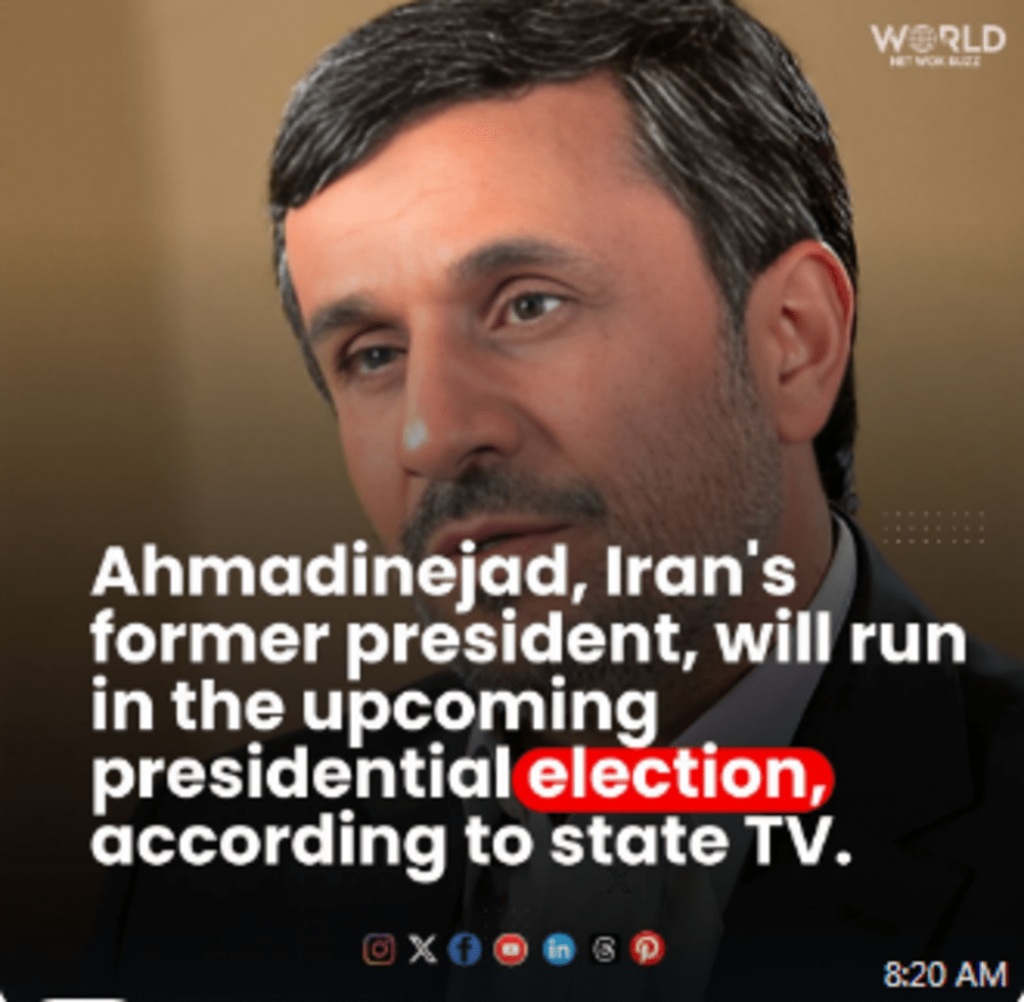Ahmadinejad's Surprising Return to Iranian Politics
In a dramatic twist of events, Mahmoud Ahmadinejad, Iran’s former president, has emerged back onto the political stage, announcing his candidacy for the upcoming presidential election. According to reports from state television, Ahmadinejad’s decision has ignited widespread speculation and interest both within Iran and across the globe. Here, we delve into the implications and potential consequences of his unexpected return.

In a surprising turn of events, Iran’s former president, Mahmoud Ahmadinejad, has announced his intention to run in the upcoming presidential election, as reported by state television. Ahmadinejad’s decision marks a significant development in Iranian politics, potentially reshaping the landscape of the forthcoming election. With his controversial tenure as president from 2005 to 2013, Ahmadinejad’s candidacy is poised to stir both domestic and international interest, raising questions about the future direction of Iran and its relations with the global community.
Political Landscape Shake-Up
In a dramatic twist of events, Mahmoud Ahmadinejad, Iran’s former president, has emerged back onto the political stage, announcing his candidacy for the upcoming presidential election. According to reports from state television, Ahmadinejad’s decision has ignited widespread speculation and interest both within Iran and across the globe. Here, we delve into the implications and potential consequences of his unexpected return.
Populist Appeal
Throughout his presidency, Ahmadinejad cultivated a strong base of support among Iran’s lower-income and rural populations through his populist rhetoric and policies. His emphasis on social welfare programs, subsidies, and anti-corruption campaigns endeared him to many Iranians who felt marginalized by the elite ruling class. By reentering the political arena, Ahmadinejad aims to capitalize on this grassroots support and appeal to disenfranchised segments of society once again.
Potential for Divisiveness
However, Ahmadinejad’s candidacy is not without its detractors. During his tenure as president, he faced widespread criticism both domestically and internationally for his confrontational approach to diplomacy and human rights abuses. His reelection in 2009 sparked mass protests amid allegations of electoral fraud, leading to a brutal crackdown on dissent. As a result, his return to politics could exacerbate existing divisions within Iranian society and reignite tensions between reformist and conservative factions.
Foreign Policy Ramifications
Ahmadinejad’s previous tenure was characterized by a confrontational stance towards the West, particularly the United States and Israel. His incendiary rhetoric and controversial statements on sensitive geopolitical issues earned Iran a reputation as a pariah state and exacerbated international tensions. With his return to Iranian politics, there is apprehension about the potential implications for Iran’s foreign policy direction. Will Ahmadinejad’s candidacy signal a return to his hardline approach, further isolating Iran on the global stage? Or will he adopt a more conciliatory tone in light of changing geopolitical dynamics?
Economic Challenges
In addition to geopolitical concerns, Ahmadinejad’s candidacy raises questions about Iran’s economic future. During his presidency, Iran faced crippling sanctions imposed by the international community in response to its nuclear program, which had devastating effects on the country’s economy. While Ahmadinejad implemented populist measures to alleviate the impact on ordinary Iranians, his economic policies were criticized for exacerbating inflation and exacerbating income inequality. As Iran grapples with ongoing financial challenges, including high unemployment and inflation, Ahmadinejad’s candidacy introduces uncertainty about the country’s economic trajectory.
Uncertain Electoral Outcome
Ultimately, Ahmadinejad’s return to Iranian politics injects a sense of unpredictability into the upcoming presidential election. While he may have a dedicated base of supporters, he also faces formidable opposition from within Iran’s political establishment and civil society. The outcome of the election will depend on various factors, including voter turnout, campaign strategies, and the broader socio-political climate leading up to the polls.
Conclusion
Ahmadinejad’s decision to run in Iran’s upcoming presidential election has profound implications for the country’s political future and its relations with the international community. His candidacy has the potential to reshape the domestic political landscape, reignite geopolitical tensions, and influence Iran’s economic trajectory. As the election draws nearer, all eyes will be on Iran to see how this unexpected development unfolds






